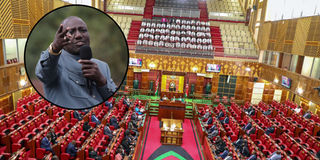
A section of Parliament Buildings, Nairobi.
Parliament is once again in the spotlight over accusations that it has become an extension of the Executive, with the minority claiming that the legislature has been captured by the state.
At the centre of the allegations is the conduct of the two speakers of the National Assembly and the Senate, who have been accused of rubber-stamping all government business.
The chairmen of Kenya's Kwanza Committee have also been implicated in recent protests for going soft on rogue government officials who snub committee summons.
But the Azimio la Umoja One Kenya coalition has not been spared either, as it has repeatedly failed to muster its numbers in both Houses on key Bills such as the Affordable Housing Bill, 2023 and the Finance Bill, 2023.
Recently, Azimio senators walked out of a Senate housekeeping retreat to protest the conduct of Speaker Amason Kingi.
The lawmakers accused the former Kilifi governor of turning the Senate into a Kenya Kwanza House playground.
Led by Minority Leader Stewart Madzayo, the senators accused the Speaker of being a puppet of the ruling regime by helping to push through unconstitutional bills pushed by President William Ruto's administration in open defiance of the rules of the House.
Senator Madzayo said that Speaker Kingi has contributed to the hijacking of the Senate by the ruling regime by stifling debate on controversial bills and displaying open bias in presiding over government business.
He pointed out that there are currently several unconstitutional bills that have been rushed through the Senate despite the reservations of the minority.
The Kilifi senator cited the Water (Amendment) Bill, the Affordable Housing Bill, the Social Health Insurance Fund Bill and the Health Promoters Bill.
"We have witnessed the emergence of a phenomenon where shortcuts are taken to fast-track government bills, debate on the floor is restricted and Kenya Kwanza elected leaders ask the Speaker to 'put the question' without any debate," said Mr Madzayo.
The latest protests come at a time when senior government officials have been snubbing parliamentary committee summonses without any sanctions.
Earlier this month, the chairperson of the Senate Committee on Energy, Nyeri Senator Wahome Wamatinga, blatantly refused to issue summons against Energy Cabinet Secretary Davis Chirchir, despite the fact that he has continued to ignore the committee's summons.

A past sitting at the National Assembly. By using public pronouncements that border on instructions and thinly veiled threats to the lawmakers, President William Ruto (inset) has had his way in the National Assembly and Senate.
Several ministers have also continued to snub appearing before the Senate plenary to answer questions about their ministries without being reprimanded as Kenya Kwanza enjoys an absolute majority in Parliament.
Taking advantage of Kenya Kwanza's numerical strength in Parliament, the ruling alliance has taken advantage of provisions in the Standing Orders that allow the time for publication of a Bill to be reduced from 14 days to two.
As a result, several government bills have been rushed through parliament, leading to walkouts by the minority or court cases challenging the legislation.
The Executive has also allegedly twisted Parliament's arm by ensuring that regulations on controversial Bills are introduced after MPs have passed the legislation, preventing MPs from scrutinising them.
In a complete departure from his predecessor, Speaker Kingi has adopted a new style to deal a blow to opposition senators and some of Ruto's allies by constantly reminding them that he is an Alliance High School alumnus.
He also wasted no time in invoking Standing Order no. 1, which gives the Speaker the discretion to issue any ruling or directive, as he sometimes finds himself at loggerheads with members who blatantly ignore his instructions.
He has become synonymous with instructing members to state and read out the Standing Orders under which they are raising their points of order, and if they are at fault, they feel his wrath.
His firm grip and no-nonsense attitude has extended to his team at the Speaker's Panel, whom members have accused of always ignoring their pleas once a position has been taken.
Once, Nairobi Senator Edwin Sifuna argued that even though they were in the minority, they should be allowed to speak without arbitrarily limiting debate time to speed up the legislative process.
In the National Assembly, things are no different, even the Kenya Kwanza MPs have had their 'dose' tested, especially when CSs appear to respond to questions.
Often not, the Speaker, Moses Wetang'ula, takes it upon himself to read their answers and explain to the members what it means, automatically becoming the 'mouthpiece of the Executive'.
His mastery of the language of the queens has left members afraid of exposing their ignorance and therefore reluctant to engage in intense debate like first-time MPs.
Even the concerns of Alego/Usonga MP Samuel Atandi at one point about the quorum problem when the House was considering the critical Bills were ignored by the Deputy Speaker, Gladys Boss Shollei, who insisted that she was satisfied that there was a quorum to conduct the business of the House.
Ms Shollei even called out Seme MP James Nyikal, a ranking member, during one of the sittings, telling him he was being disruptive during a plenary session when she vacated the Speaker's seat to allow temporary Speaker Gilgil MP Martha Wangari to lead members in the Committee of the Whole on the Houses of Parliament (Bicameral Relations) Bill 2023.
"Hon Nyikal, you are actually becoming very popular for just being a nuisance and trying to cause trouble in the House. Let's try to conduct the business of the House with the decorum that the country deserves," the DS instructed.
Minority Leader Opiyo Wandayi also accused the Executive of abusing its majority in the House to rush through legislation and criticised the rushed nature of the consideration of Bills in the House.
The absentee committee chairs saw Majority Leader Kimani Ichung'wah admit that when he served as the Budget and Appropriations Committee chair in the 12th Parliament, he never missed a session to respond to questions.
Nominated MP John Mbadi said Parliament had lost its independence, pointing out that the President often dictates to the House to approve government Bills, including the SHIF and the Hustler Fund.
"We cannot have a situation where the President attends a rally and tells Parliament to pass a Bill by a certain day. It is embarrassing," said the ODM chair.
Recently, two Murang'a MPs chased away KRA officials who had turned up to sensitise farmers on provisions in the Finance Act 2023 that require businesses to generate and submit their invoices to the taxman electronically.
The two MPs teamed up with local farmers to stop the officials' awareness campaign about the impending tax on avocado farmers, despite the controversial Bill having been passed in Parliament.
In their defence, the lawmakers claimed that the document was a large booklet for them to read in such a short time and pleaded ignorance of the consequences of voting for the Bill.
"The problem is not that MPs pass the bill and then complain. The Finance Bill was a big document and you can't expect MPs to go through it and find the nitty-gritties. It's like the pastor who doesn't know all the Bible verses," said Maragua MP Mary Wamaua.
Vihiga Senator Godfrey Osotsi said Parliament had reached a point where it was no longer representing the interests of the people but those of individuals such as the President or party leaders.
In the Senate, he said, committees produce reports but later disown them because of party interests. Mr Osotsi cited the example of the Senate Finance Committee which had a report recommending that counties be allocated Sh407 billion as equitable revenue share, only for the Kenya Kwanza members of the committee to reject the report on the floor after being whipped to accept Sh385 billion.
He also cited the issue of Kandara and Gatanga MPs inciting their residents to reject taxes levied on avocado farmers yet they voted for the Finance Bill.
Also Read: MPs raise own budget allocation by Sh2bn
The senator said the two did not vote for the Finance Bill because they supported it but because they were whipped.
"We are gradually seeing a trend in the Senate where the Kenya Kwanza side is there to rubber stamp whatever comes from the government whether it is unconstitutional or not," said Mr Osotsi.
"Parliament is gradually being taken over by the Executive. Not only in the Senate but also in the National Assembly," he added.
He also took issue with the behaviour of Speaker Kingi, whom he accused of openly taking sides during debates in the House.
"Once you are elected speaker, you stop playing politics. When you sit in that seat, you cease to be Kenya Kwanza or Azimio and become a neutral arbiter. But we have a Speaker who is openly taking sides," he said.
Migori Senator Eddy Oketch also denounced a trend of Executive overreach in Parliament where the separation of powers is not respected.
But Kilifi North MP Owen Baya said the government will always have its way because it has more members.
He explained that Parliament and its committees are configured so that there is a government side and an opposition side, but the former holds the power.
"When they say that Parliament has been captured by the State, that is total nonsense. They have two whips paid by the State to whip the members into a certain way of thinking. Parliament suffers from a very weak opposition; they don't take part in debates or raise dissenting voices," said the Deputy Majority leader of the National Assembly.
"The speaker is the symbol of unity in Parliament, and if we start accusing, abusing or debating him, we are killing Parliament," he added.
But Kamukunji MP Yusuf Hassan disagreed, saying Parliament and legislative assemblies represent the people, not the Executive.
Consequently, there should be no political interference or favouritism in the work of legislators, but unfortunately that is the case.
"I fully agree that the majority will ultimately determine the type of legislation that will be passed, but the Speaker has absolutely no role in that. The Speaker is neutral and impartial, but if the Speaker takes sides then there is a serious problem. It is not the role of the Speaker to favour some people over others. There is this bias from both speakers," said Mr Hassan.
He recounted how Speaker Kenneth Marende, despite being from the opposition, earned the respect of the House because of his demeanour, behaviour and the way he engaged MPs.
"This bias is not good for Parliament because there is a growing lethargy that is affecting attendance leading to chronic lack of quorum."
Opposition leader Raila Odinga has often accused Parliament of pandering to the whims of the Executive, ignoring its oversight role and going to bed with the government.
He has questioned the neutrality of Speaker Wetang'ula and accused Parliament of lacking independence in taking up and even debating matters before it.
The former prime minister said the August House had consistently passed government-sponsored legislation that failed to defend the welfare of the electorate. He also took a swipe at current MPs, saying they had been held hostage.
Parliament is no longer a check on the Executive because the referee is never neutral in his decisions," Mr Odinga said.
"Unlike Wetang'ula, Marende was someone who abided by the law and served this country very well," the ODM leader added.
In December last year, the Azimio party sued Speaker Wetang'ula, accusing him of violating the Constitution.
In documents filed in court, the coalition faulted Mr Wetang'ula for allegedly delaying the appointment of Sabina Chege MP as Azimio's deputy chief whip.
They also accused the speaker of recognising Jubilee as a parliamentary party and subsequently appointing Ms Chege as its interim chief whip.
The Azimio leader also accused Wetang'ula of state capture, citing his alleged frequent and irregular visits to State House for the passage of numerous bills.
But Wetang'ula defended himself, saying he was required by law to attend such meetings.










